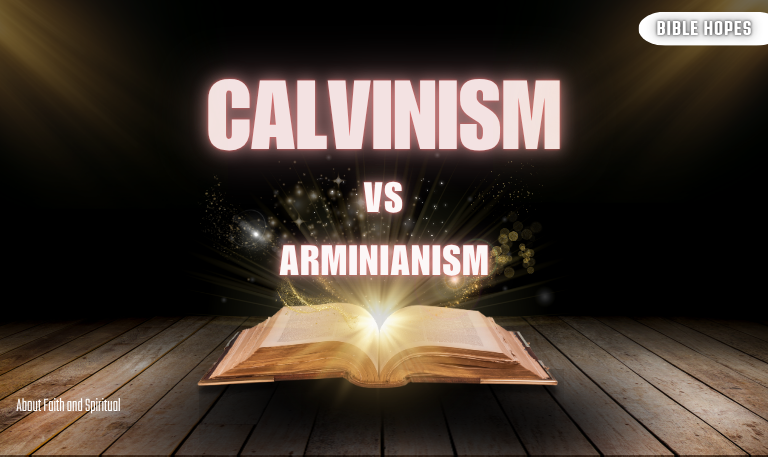Understanding Calvinism vs Arminianism is crucial for anyone exploring Christian theology, especially those interested in doctrines about salvation, free will, and divine sovereignty. These two theological frameworks have shaped centuries of Christian thought, worship, and denominational distinctions. This guide offers an expert, comprehensive exploration of their origins, core beliefs, differences, and practical implications, serving as your definitive resource.
1. Why Calvinism vs Arminianism Matters
The debate between Calvinism and Arminianism centers around how God interacts with humanity, particularly concerning salvation. This conversation influences doctrine, worship styles, evangelism, and the believer’s assurance of salvation. Knowing the nuances helps Christians understand theological diversity and promotes respectful dialogue.
2. Historical Background: Origins and Key Figures
Calvinism: The Legacy of John Calvin
Emerging during the Protestant Reformation in the 16th century, Calvinism derives from the teachings of John Calvin (1509–1564), a French theologian and pastor. Calvin emphasized God’s absolute sovereignty and predestination.
Arminianism: The Influence of Jacobus Arminius
In the early 17th century, Jacobus Arminius (1560–1609), a Dutch theologian, challenged strict Calvinist predestination. His views prioritized human free will and conditional election, sparking what became the Arminian movement.
The Synod of Dort (1618–1619)
This international assembly condemned Arminianism and affirmed Calvinist doctrine, formally articulating the Five Points of Calvinism (TULIP). Arminianism remained influential, particularly in Methodist traditions.
Read Also: What Is Calvinism
3. Core Doctrines of Calvinism Explained (TULIP)
Calvinism is summarized by the acronym TULIP, representing five central points:
Total Depravity
Every aspect of humanity is affected by sin, rendering people incapable of choosing God without divine intervention.Unconditional Election
God elects individuals for salvation based on His sovereign will, not on any foreseen merit or faith.Limited Atonement
Christ’s atonement is specifically for the elect and effectively secures their salvation.Irresistible Grace
The saving grace of God cannot be resisted when applied to the elect.Perseverance of the Saints
Those truly chosen by God will persevere in faith until the end.
4. Core Doctrines of Arminianism
Arminianism emphasizes conditional election and human free will, often summarized in its Five Articles of Remonstrance:
Free Will and Human Responsibility
While human nature is fallen, God’s prevenient grace restores the ability to choose salvation.Conditional Election
God’s election is based on foreseen faith or unbelief.Unlimited Atonement
Christ died for all people, and salvation is available to anyone who believes.Resistible Grace
God’s grace can be resisted and rejected by individuals.Possibility of Apostasy
Believers can fall from grace and lose salvation if they turn away.
5. Detailed Comparison: Calvinism vs Arminianism
| Doctrine | Calvinism | Arminianism |
|---|---|---|
| Predestination | Unconditional, sovereign election | Conditional on foreseen faith |
| Human Free Will | Bondage to sin; no free will | Free will enabled by grace |
| Atonement | Limited to the elect | Unlimited for all |
| Grace | Irresistible | Resistible |
| Salvation Security | Perseverance of the saints (eternal security) | Possible to lose salvation (apostasy) |
6. Philosophical and Theological Implications
Divine Sovereignty vs Human Responsibility
The Calvinist view stresses God’s absolute control over salvation events, while Arminianism balances God’s sovereignty with human choice.
The Problem of Evil and Free Will
Calvinism views evil as permitted by God’s sovereign plan; Arminianism attributes evil partly to human misuse of free will.
Assurance of Salvation
Calvinists often find assurance in God’s unchanging election, whereas Arminians emphasize ongoing faith and perseverance.
7. Modern Denominational Perspectives
Calvinism
Presbyterian Church
Reformed Churches
Some Baptist groups (Particularly Particular Baptists)
Arminianism
Methodist Church
Wesleyan denominations
Pentecostal churches
8. Common Misconceptions Debunked
Calvinism is fatalistic: Rather, it asserts God’s sovereignty works with human choices.
Arminianism denies grace: It upholds grace but emphasizes human response.
Calvinists believe God predestines people to hell: Calvinism teaches God elects for salvation, but damnation is due to human sin.
Arminianism is semi-Pelagian: Arminians emphasize prevenient grace that initiates salvation.
9. Impact on Christian Life and Worship
Calvinism influences worship styles emphasizing God’s majesty and sovereignty, often encouraging assurance in salvation.
Arminianism tends to emphasize evangelism, human responsibility, and the ongoing possibility of repentance.
10. Critiques and Theological Challenges
Calvinists criticize Arminianism for undermining divine sovereignty.
Arminians challenge Calvinism for limiting God’s love and human freedom.
Both perspectives grapple with reconciling divine justice and mercy.
11. Interdenominational Dialogue and Unity
Many contemporary theologians promote respectful dialogue, focusing on shared Christian beliefs rather than divisive doctrines, fostering unity in diversity.
12. Influential Theologians and Their Contributions
Jonathan Edwards (Calvinism): Emphasized God’s sovereignty and the revival movement.
John Wesley (Arminianism): Founded Methodism with an emphasis on free will and holiness.
Contemporary voices such as Tim Keller (Calvinist) and Roger Olson (Arminian) continue the dialogue.
Read Also: Christianity Vs Jehovah Witness
13. Scriptural Foundations in Both Traditions
Both Calvinism and Arminianism claim strong biblical support:
Calvinists highlight Romans 9, Ephesians 1, and John 6.
Arminians emphasize John 3:16, 1 Timothy 2:4, and 2 Peter 3:9.
Calvinism vs ArminianismFAQs
Q: What is the main difference between Calvinism and Arminianism?
A: Calvinism emphasizes God’s sovereign election, while Arminianism stresses conditional election based on human free will.
Q: Does Calvinism teach that God predestines people to hell?
A: No, Calvinism teaches God elects some for salvation; others are condemned due to their own sin.
Q: Can a person lose their salvation according to Arminianism?
A: Yes, Arminianism teaches it’s possible to fall away from grace through unbelief or apostasy.
Q: Is Arminianism compatible with biblical teaching?
A: Yes, Arminians argue their view aligns with scripture emphasizing human choice and God’s universal love.
Q: How do Calvinists explain human free will?
A: Calvinists view human will as free but bound by sinful nature, with God enabling new desires in the elect.
Q: What denominations follow Calvinism or Arminianism?
A: Calvinism is prevalent in Presbyterian and Reformed churches; Arminianism is dominant in Methodist and Wesleyan traditions.
Q: How does each view impact daily Christian living?
A: Calvinism encourages assurance and trust in God’s plan; Arminianism encourages active faith and ongoing repentance.
Q: Are Calvinism and Arminianism mutually exclusive?
A: Yes and no; while they differ on key doctrines, many Christians respect both views as biblically grounded.
Q: How do Calvinism and Arminianism view God’s justice and mercy?
A: Calvinism highlights God’s justice in sovereign election; Arminianism emphasizes God’s mercy extended to all.
Q: Which view is more popular today?
A: Arminianism is numerically widespread due to Methodism and Pentecostalism; Calvinism has seen resurgence in Reformed circles.
Conclusion
The Calvinism vs Arminianism debate reflects enduring questions about God’s nature and human freedom. Both offer profound insights and challenges. Approaching these doctrines with respect, curiosity, and a heart for truth enriches Christian faith and fellowship.



![15 Pink Bible Verses | Discover Meaning, Love [2025 Guide] 5 15-Pink-Bible-Verses-Discover-Meaning,-Love-[2025-Guide]](https://biblehopes.com/wp-content/uploads/2025/05/15-Pink-Bible-Verses-Discover-Meaning-Love-2025-Guide.png)